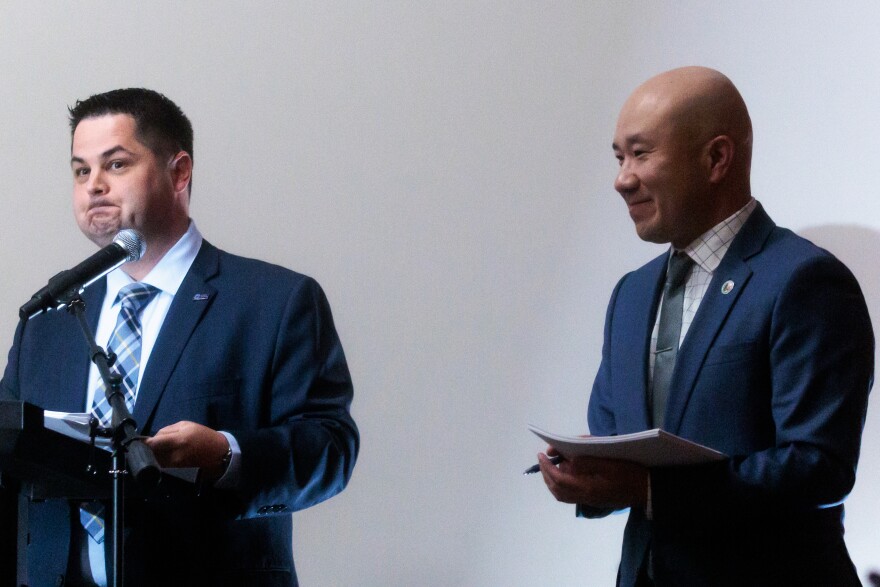Richmond and Henrico County officials opened talks about ways to improve the region’s water system during a joint meeting Monday, after issues at the city’s main water treatment plant led to outages and several state violations earlier this year.
But the sometimes-uneasy meeting ended without specific plans for a future path — as the Richmond City Council hasn’t decided how much oversight it wants the city’s regional water customers, including neighboring counties, to have.
Richmond Mayor Danny Avula called for the council and Henrico’s Board of Supervisors to discuss the January water crisis and changes made to the Douglasdale Road plant since.
The talks also focused on a potential regional advisory group made up of local officials to consider ways the localities can work together, and possibly giving Henrico and other customers a say on day-to-day operations and long-term infrastructure investments at the city-run water plant.
After the meeting at the Richmond Department of Public Utilities building on Commerce Road, Avula told reporters that councilors need more time to consider how they want to move forward. He said the Richmond City Council will ultimately decide what a regional relationship could look like — or if the status quo stays in place.
“If we want more investment by our regional partners, that's going to come with some exchange of oversight or authority or decision-making power,” he said. “It's only natural, right? If Henrico is going to invest a bunch of money in the system, they're going to want a seat at the table.”
January’s water crisis, sparked by flooding after a winter storm–induced power outage, kept the city from delivering usable water to both Richmonders and county residents for days. Then, in late May, clogged filters at the facility led to boil advisories in parts of Richmond and Henrico.
The city-run water plant has struggled with operational and mechanical problems, including communication delays that hindered neighboring counties’ responses to the January outage, multiple reviews found.
The city outlined infrastructure upgrades made since January and unveiled more details for an advisory group that would explore future options at Monday’s meeting, which got tense as members clashed over the city’s responsibilities, Henrico’s water usage during the May incident and the county’s data centers.
Under the city's concept document, the advisory group would convene in July and meet every other month. The panel would make final recommendations at its March 2026 meeting that would take effect July 2026, if adopted by local governing bodies.
City Council President Cynthia Newbille said the nine-person body would need to do “a deeper dive” on the framework for a potential advisory group to help guide discussions of more regional teamwork. Newbille said the council would discuss feedback from Henrico’s supervisors during a special meeting on July 7.

Monday’s meeting also exposed underlying tensions between the local government bodies.
Richmond 6th District Councilor Ellen Robertson told Henrico’s supervisors that the county — the city’s largest water customer — shouldn’t be concerned about past issues that plagued the main water treatment plant.
“We’re not hopping along, scared we’re going to break down everyday,” she said. “That’s not the condition that this plant is in.”
Varina Supervisor Tyrone Nelson questioned Robertson’s remarks, saying Monday was the first time he had heard city officials express total confidence in the plant’s reliability.
Nelson stressed that Henrico wasn’t looking to force Richmond into a regional water authority, telling councilors he and other supervisors don’t want one, but that Henrico expects answers about issues that caused disruptions, particularly within its own borders.
“We’re customers,” he said, noting that Henrico pays the city nearly $14 million annually for water. “If this was our water treatment plant and you were getting water from us, you would have questions just like we would.”
Henrico’s 1994 agreement with Richmond to buy up to 35 million gallons of water (MGD) per day is set to end in 2040. The county also has a water treatment plant that can produce up to 80 MGD.
Chesterfield and Hanover counties, the city’s other wholesale water customers, were also invited to take part in the advisory group discussions. The localities have held internal talks — and a recent Henrico–Hanover joint meeting — about ways to reduce their own reliance on the city’s water.
Another point of contention came when 3rd District Councilor Kenya Gibson raised concerns over Henrico’s data centers, which she called the “elephant in the room” due to the county's increasing need for significant water consumption.
Nelson and Three Chopt Supervisor Misty D. Roundtree pushed back, saying the recent water issues came after problems at the water plant the city oversees and telling her not to “conflate” the issues.
Gibson also brought up a Virginia Department of Health memo that said Henrico increased its water flow during May’s filter incident, despite the city believing the opposite. Henrico officials admitted “miscommunication” led to the increase, but didn’t provide additional details.
Despite urging the council and board to come together, Avula echoed assessments by Richmond Public Utilities Director Scott Morris that the Douglasdale Road plant is currently in “good shape,” and problems that the facility faced have been resolved.
Avula added that he feels confident in the city’s ability to deliver water if the status quo remains, but that it would be a “missed opportunity for co-investment.”
The mayor added that some improvements outlined by VDH, such as moving the plant’s pumps and filters out of the basement and to the ground level, could be done sooner with more funding.
Opening up conservations on Monday was the “first step” in the process, Avula said, a sentiment Henrico officials agreed with.
Henrico Vice Chair Roscoe Cooper told reporters after the meeting that he feels an advisory group is needed to weigh potential paths forward.
“I think it will help with redundancies, resiliency, reliability,” he said. “It will help us be collaborative and communicative.”
Cooper, who represents the Fairfield District, admitted Monday’s meeting “got a little tense,” but said delivering safe water to residents is too important and the effort demands scrutiny: “This is a very tense situation. These are people's lives.”














